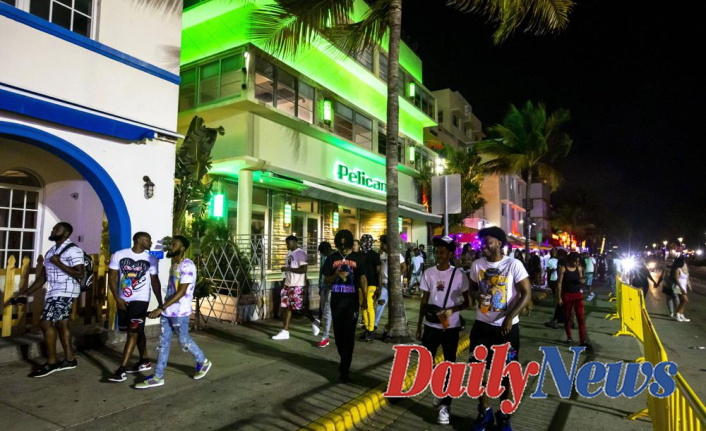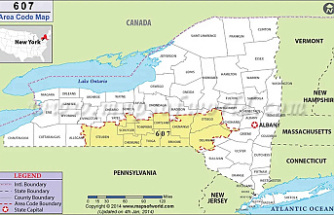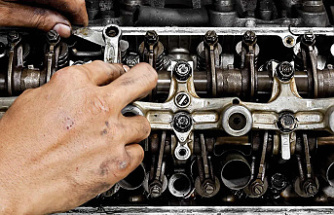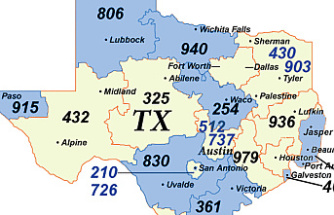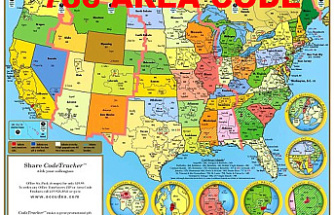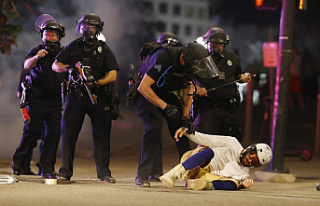Some business owners claim they are being unfairly targeted by regulations. Civil rights advocates claim the city is trying scare away Black tourists, who make up a large portion of the city's visitors.
Two shootings last weekend that left five people injured prompted the city to impose a emergency midnight curfew . This weekend's action has refocused attention back on the waterfront's future as an entertainment area or as a tourist destination.
This 10-block stretch of Ocean Drive is known for its art deco restaurants, bars, and hotels. Long-time residents know to treat spring break as a hurricane. Stay in your home and wait until it passes.
Resident Pedro Herrera (40), said that spring break is great for business at his hotel, but he avoids tourist areas when he is off-duty.
Herrera stated that "Before spring break you can walk on Ocean Drive," but she prefers to stay at home because she knows that if she goes there, something will happen. "
Mayor Dan Gelber stated that spring break and holiday weekends have been a problem in the city since before his election in 2017. He views the long-term solution in the transformation of the area around Ocean Drive into a cultural and entertainment district. This will replace all-night bars with boutique offices and residential development.
Gelber stated that we don't need an entertainment-only area.
Ocean Drive was built in the 1920s and 30s. It is the heart of Miami's Art Deco District. After a period of decline, the area experienced a revival thanks to TV shows like "Miami Vice" and Gianni Versace, who moved into an oceanfront home in the 1990s. South Beach became a popular destination for musicians, supermodels, and other entertainers.
Gelber stated, "Now we have this business model that sells big drinks in large quantities all night with tens to thousands of people." "
Gelber stated that he still wants a 2 a.m. South Beach liquor ban. This was stopped by a circuit court judge in early March. South Beach businesses have been resisting the rule that only targets their area.
A legendary Clevelander bar and hotel on Ocean Drive sued the city for the alcohol rollback. Joshua Wallack (chief operating officer at nearby Mango's Tropical Cafe) stated that the rules give bars outside the target area an unfair edge and threaten local businesses with closure.
Wallack stated that they are pushing for a ban at 2 a.m., but with exceptions. "
Fontainebleau Miami Beach, a luxury hotel, is located more than a mile from the South Beach area. LIV nightclub stays open until 5 a.m.
Civil rights advocates think city officials are worried about the visitor demographics. The event's popularity correlates with a rise in Black tourism throughout the year.
Stephen Hunter Johnson is an attorney and member the Miami-Dade Black Affairs Advisory Board. He said that if there were two non-fatal shootings within two days, it was sufficient to warrant a emergency. The entire county should then be in an indefinite state of emergency .
Johnson stated that the only emergency in Miami Beach was that there were Black residents.
More then 1,000 people were detained in March when the city implemented an 8 p.m. curfew. To discourage large crowds, the mayor had cancelled all programs during the pandemic.
Johnson stated that this year's Miami Beach Live concert series was a failure. The city tried to bring back programming to spring break but it completely ignored the young urban population by booking artists such as Bernadette Peters and 1990s alt-rocker Alanis Morrissette.
Miami Beach mayor denies that the city is trying to discourage Black tourists.
Gelber stated that the issue this weekend was clearly related to behavior, not race. Gelber added that spring break was granted for three weeks and did not ask for a curfew or invoke the emergency powers. It took place the morning after two shootings. "
While many visitors find it unfair to be shocked by restrictions after planning their spring break months or even years in advance, most people are determined to have a great time.
Anwar Hashedan, 21 years old, visited Washington, D.C. and said that he will just find another thing to do after the curfew.
Hassan stated, "I'm going to not let this limit my travel." "

